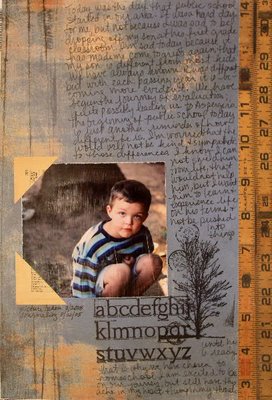 it has been almost a year since i did this page about ryne. well, we finally have the diagnosis. Nonverbal Learning Disorder, ADHD, and anxiety disorder. i am not shocked, in fact, this is what i have known for a long time. it has been such a long road trying to understand. i am relieved and excited. i am starting to feel like this is just the beginning. with this diagnosis we will be able to get all the services and help he needs. the diagnosis also brings new understanding.
it has been almost a year since i did this page about ryne. well, we finally have the diagnosis. Nonverbal Learning Disorder, ADHD, and anxiety disorder. i am not shocked, in fact, this is what i have known for a long time. it has been such a long road trying to understand. i am relieved and excited. i am starting to feel like this is just the beginning. with this diagnosis we will be able to get all the services and help he needs. the diagnosis also brings new understanding. What is NLD?
NLD is a neurological disorder which originates in the right hemisphere of the brain. Reception of nonverbal or performance-based information governed by this hemisphere is impaired in varying degrees, causing problems with visual-spatial, intuitive, organizational, evaluative, and holistic processing functions.
The syndrome of Nonverbal Learning Disorders (NLD) consists of specific assets and deficits.
The assets include:
- Early speech and vocabulary development
- Remarkable rote memory skills
- Attention to detail
- Early development of reading skills and excellent spelling skills
- Eloquent verbal ability
- Strong auditory retention
The three categories of deficits are:
- Motoric: lack of coordination, problems with balance and graphomotor skills
- Visual-spatial-organizational: lack of image, poor visual recall, faulty spatial perception, and difficulty with spatial relations
- Social: inability to comprehend nonverbal communication, difficulty adjusting to transitions and novel situations, and deficits in social judgment
People with NLD can be affected in varied levels of severity in each of the categories, so that each person with NLD presents a unique clinical, behavioral, and educational picture. People with NLD can be helped by many forms of therapy, but their world is filled with confusing sensory stimuli. For some, their physical endurance is challenged by generally low muscle tone. Some need support throughout life with cognitive and organizational skills, motor skill development, pragmatics and social skills.
Children with NLD have advanced verbal and auditory memory. Some are precocious readers with advanced vocabularies. Nevertheless, NLD is a problem of language. People with NLD have rote language skills but when it comes to functional daily use of language, they have difficulties with tone of voice, inference, written expression, facial expression, gestures, and other areas of pragmatic speech.
People with NLD have difficulty understanding patterns and lining up columns of numbers. Spoken instructions can be troublesome due to difficulty picturing consecutive directions and poor visual memory. NLD can also affect coordination, causing clumsiness, poor balance and a tendency to fall. Many people with NLD have poor safety judgment.
We are not sure what causes NLD, but we know that the earlier the intervention, the better the prognosis.
excerpt taken from nlda.orgi'm going to be sending out packets of information to family and those that have contact with Ryne. i hope you will take the time to read and educate yourself. thanks to everyone for their love and support.

3 comments:
you are such a good momma...
so glad we "met"...
xxxe
Rachelle, so glad you found out what it is and that he can now get the proper treatment!!
Always thinking about you, girl...
Morning:
I am glad you posted this. How did you find out? What type of DR did you visit to be diagnosed.
I think my little cousing might be diagnosed with this.
Any info you can parlay will be great.
Thank You,
Maggie
Post a Comment